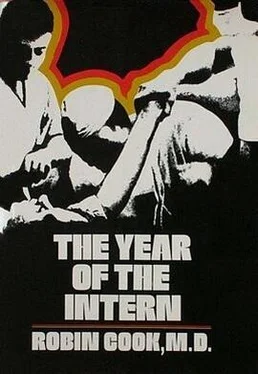Sitting down was a luxurious experience. I stretched my feet out under the table onto a chair opposite. Joyce came along and sat by me, which was pleasant, although we didn’t have much to say to each other. She was full of laboratory gossip and blood counts, which threatened to give me indigestion; nor did I want to discuss the ER. I ate rapidly, knowing that each bite might be my last for the night. At least that part of television’s view of medicine is dead right. We ended up talking about surfing with another intern, named Joe Burnett, from Idaho.
Every intern needs an outlet, a safety valve; surfing was mine. It provided the perfect detachment and escape. Not only was the environment different in sound, sight, and feeling; on top of a decent wave, struggling and concentrating to make the shore, no other thought was possible. As the months passed and my addiction to surfing grew, I began to understand why people follow the sun in search of the perfect wave. I suppose it’s healthier than drugs and alcohol, but its grip is just as strong, and a bad move can kill you. Hawaii does not publicize that last fact very widely.
But never mind that. Even if the waves weren’t good, beauty was all around. And who could tell? — any minute a big one might rise up to challenge you. Surfing is its own thing, basically unlike any other sport, although it superficially resembles snow skiing. The difference is that in skiing the mountain stays still; on a wave everything moves — you, the mountain, the board, the air around you — and when you fall off your board in a big wave you have no say about where you go. All you know is you weren’t meant to be there. So Joe and I talked about surfing, excitedly describing little episodes, our hands and feet motioning and moving, telling how the waves curled, how we got locked in or wiped out, everything. And I forgot about the ER.
Curiously, surfing is not a sociable sport except when you are away from the water talking about it. Out there on your board you hardly speak. You’re part of a group of detached people held together by a bond of water, but you are unmindful of the others except to curse if someone drops in on your wave. Every wave you catch is somehow your wave, even though you don’t go surfing alone. You always go with someone, but you don’t talk.
The phone rang for me, and I had to break off with Joe; the ER was getting some business. It wasn’t peaceful any more when I arrived. During my thirty minutes away, more babies had come in, crying with the usual complaints. A teen-aged girl complained of cramps. I asked her how much relief she had obtained with aspirin. She hadn’t tried any aspirin yet. I gave her two. Another miracle cure worthy of four years of medical school. And the colds. There were several people with plain old garden-variety colds — runny nose, irritated throat, cough, the usual. Why they had to come to the ER was beyond my comprehension. Even though I had reached my third wind after dinner, any humor in the situation was going right by me unnoticed. People were waiting to be sutured, and I had to see those with runny noses.
One of the suturing jobs was a little out of the ordinary. A lady had cleanly sliced off the tip of her index finger with a carving knife. She had been swift enough to rescue the little piece, and after I soaked it for a while, I sewed it back in place with very thin silk. All this was done while the private M.D. gave explicit instructions over the telephone. Had I seriously expected him to come down and do it himself?
One of the back rooms held an elderly man who was troubled by back pain and inability to hold his urine. The latter symptom was clear enough from the smell in the room, which nearly overpowered me as I examined the man by degrees, ducking into the hall from time to time for fresh air. Bad smells were still my bête noire. I thought maybe he should be admitted to the hospital, since he had a urinary-tract infection and obviously couldn’t take care of himself. However, the first attending I called knew him and didn’t want him as a patient. He told me to find another doctor. Seems that the old man was a notoriously bad patient, famous for disappearing from the hospital without being discharged, and always turning up again on weekends or in the middle of the night. The next doctor refused, too, and suggested yet another. Finally, after calling five M.D.’s, I got one to agree to take him as a patient, but as the nurses were preparing the man for admission they discovered he was a veteran. All my efforts on the phone flew out the window; now we had to ship him to a military hospital.
Passing by the entrance on my way to see another patient, I nearly bumped into a young woman of about twenty, clutching a poodle as she was propelled by a man not much older than she. She was screaming that she didn’t want to talk to any goddamn doctor. That was fine with me; I proceeded into the room where I was going. But I had to see her anyway, eventually, and when I did she wouldn’t say a word; it would have been easier to communicate with the poodle, still tightly clutched. I decided to let her sit a while, but that was a mistake, because a few minutes later she dashed down the hall and disappeared. I was too busy to take much notice — until the family psychiatrist arrived shortly thereafter with the girl’s parents. It seems that the hospital had called the police when the girl was found outside pulling up flowers. I was a little surprised to see the psychiatrist — I always had so much trouble getting any of them to come in on weekends or after 4:00 P.M. I could count on having two or three psych patients on Saturday night, a bad time for them. Since I never got a psychiatrist to come around, I just did what I could to make the patients quiet and comfortable; but a light sedative and kind words don’t do much for them.
“Doctor, 84,” a nurse called to me from the main counter. I picked up the phone outside Room B and poked the 84 button.
“Peters, this is Sterling.” Sterling was the orthopedic resident. “I finally got hold of Dr. Andrews, who’s covering staff orthopedics this month, and he thinks that a hanging cast would do for Morris.”
There was a pause. I began drawing interconnected circles on the scratch-pad by the phone. This bastard Sterling didn’t intend to come down and put on a hanging cast, whatever the hell that was.
“Why don’t you have a go, Peters? And if you have any trouble let me know, okay?”
“I’ve got about eight patients here I haven’t even seen yet.”
“Well, if he has to wait too long, call me back.”
“For Christ’s sake, Sterling, he’s been here since ten o’clock this morning. Don’t you call that long? I mean nine hours?”
“Aw, that’s all right. Give him a chance to sober up.”
Arguing with Sterling involved more effort and thought than I wanted to put into it, and, furthermore, it went against my new determination to keep my distance, not to get pissed off. “Okay, okay, I’ll get to it as soon as I can.” I hung up the phone, mentally mapping out the next half hour.
“Nurse, have the attendant draw up some warm water and get a supply of plaster ready down in the ortho room.”
“What size plaster, Doctor?”
“Two- and three-inch, four rolls of each.”
Putting on my most nonchalant air, I wandered into the doctors’ room and quickly scanned the shelves for a book on orthopedics. Mercifully, I found one and turned rapidly to the index. There it was — cast, hanging, see page 138, which turned out to be a discussion of breaks and fractures of the proximal humerus, just what I was looking for. Despite my apprehension at being shoved into still another strange task, I was impressed by the ingenuity of the hanging cast, which did, in fact, work by a kind of traction. Rather than encasing the patient’s whole arm and shoulder, the cast was placed only around the area just above and below the elbow, where its weight would pull downward on the fractured bone and ease it back into alignment. The whole arm was then pulled into the body by swathing the cast to the chest; this held the arm immobile but allowed movement in the shoulder. Amazing.
Читать дальше












